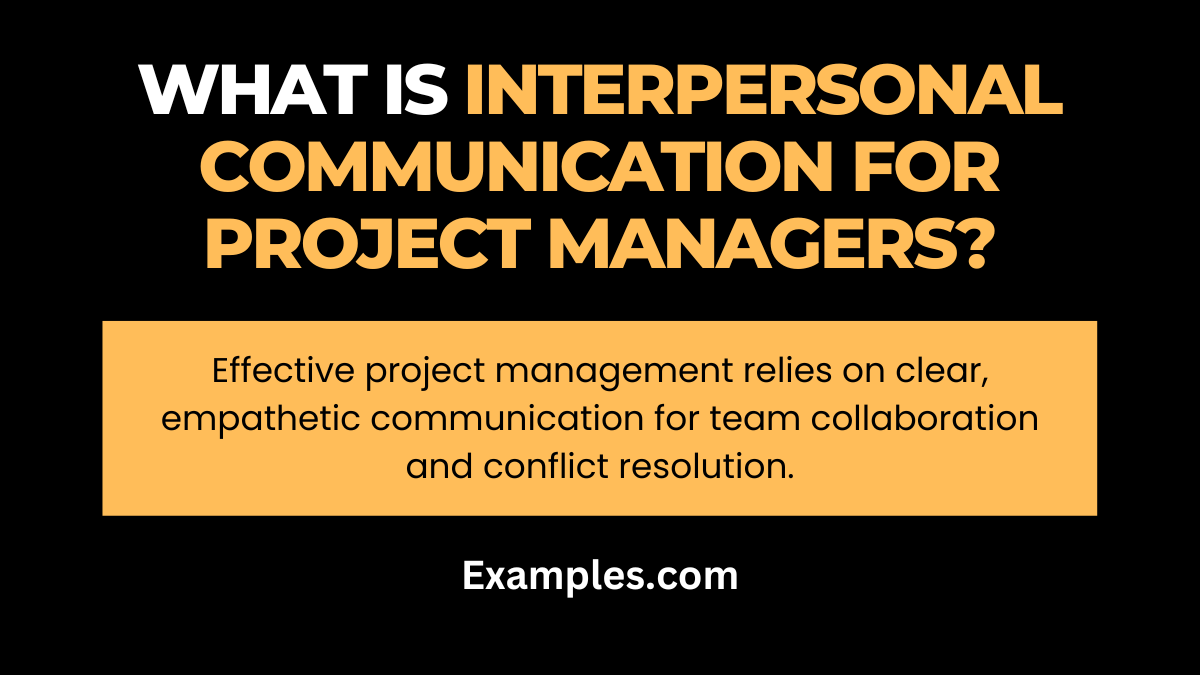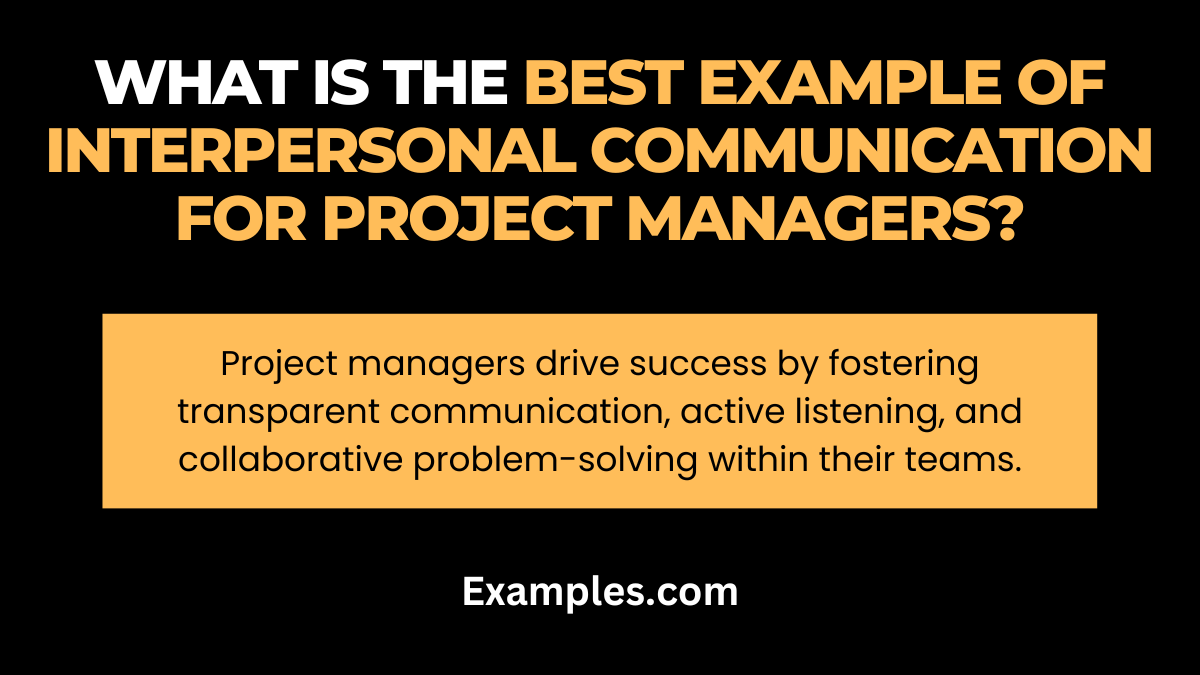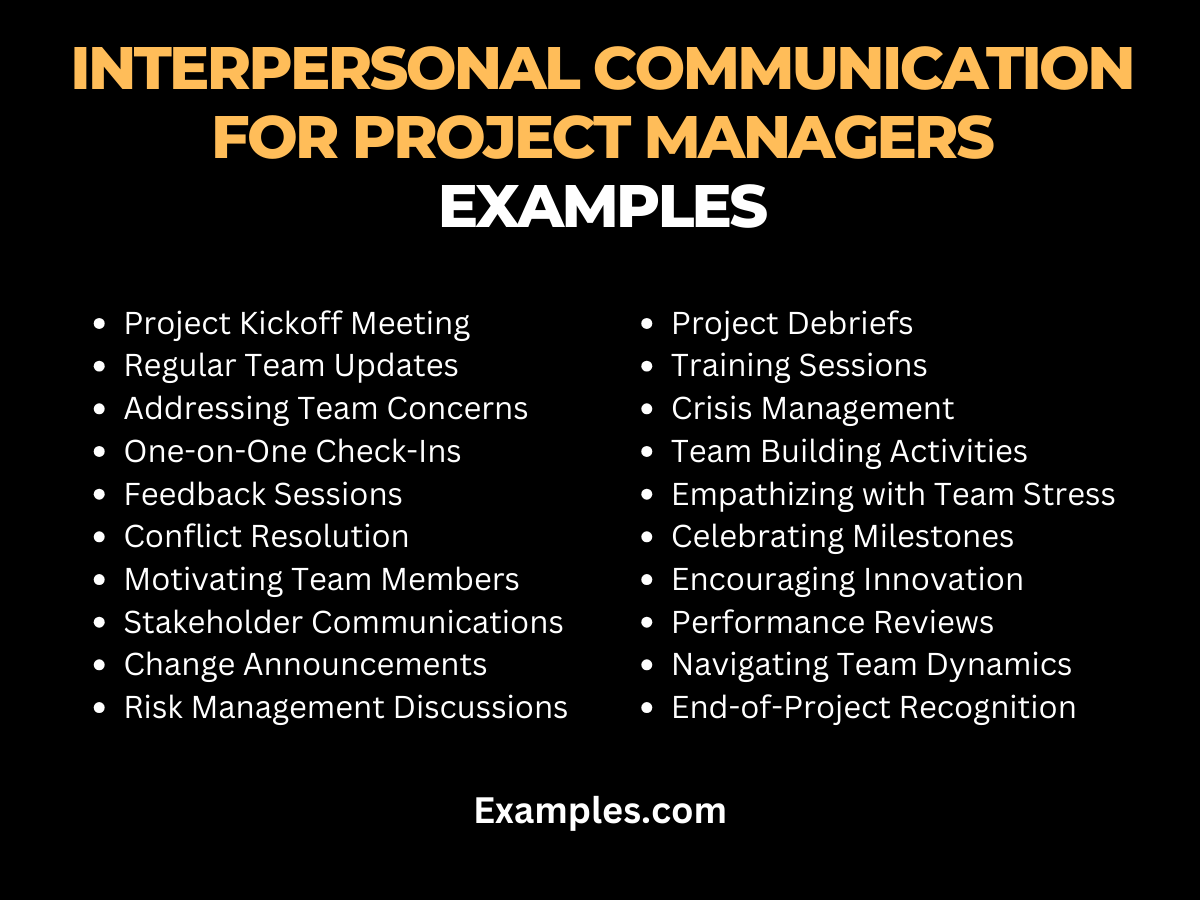19+ Interpersonal Communication for Project Managers Examples
Interpersonal communication for project managers is an integral skill that involves effective oral communication, active listening, and empathy. It’s about clearly conveying project goals, timelines, and roles to team members, and fostering an environment of open dialogue and collaboration. Effective interpersonal communication in project management ensures that all team members are aligned, challenges are addressed promptly, and the project progresses smoothly. It’s essential for building team cohesion, navigating conflicts, and leading projects to successful completion.
What is Interpersonal Communication for Project Managers?

Interpersonal communication for project managers refers to the skills and techniques used to effectively communicate within a project team. It involves the use of both verbal and non-verbal communication to guide, motivate, and understand team members. Effective interpersonal communication is crucial in project management for facilitating clear understanding, resolving conflicts, and fostering team collaboration. It’s a blend of clear instruction, active listening, and empathy, all of which are essential for successful project leadership.
What is the Best Example of Interpersonal Communication for Project Managers?

The best example of interpersonal communication for project managers is maintaining ongoing, transparent dialogue with the project team. This includes providing clear and concise project updates, actively listening to team feedback, addressing concerns, and motivating the team. For instance, a project manager conducting regular team meetings to review progress, encourage input, and collectively solve problems demonstrates effective communication. Such interactions are crucial for steering the project in the right direction and ensuring team engagement.
20 Examples of Interpersonal Communication for Project Managers

Interpersonal communication for project managers is key in orchestrating successful projects. It encompasses a range of skills including clear articulation, active listening, empathy, and the ability to motivate and guide teams. Effective communication is essential in setting project goals, resolving conflicts, ensuring team cohesion, and maintaining stakeholder relationships. These examples demonstrate various scenarios where a project manager can apply interpersonal communication skills, highlighting the importance of effectively conveying messages, listening to team input, and addressing challenges collaboratively.
- Project Kickoff Meeting: “Let’s discuss our project objectives and everyone’s role in achieving them.” Setting clear expectations and goals from the outset.
- Regular Team Updates: “Here’s the progress we’ve made this week and our next steps.” Keeping the team informed and aligned.
- Addressing Team Concerns: “I’ve noticed some challenges. Let’s work together to find solutions.” Encouraging open dialogue about issues.
- One-on-One Check-Ins: “How are you finding your current workload?” Assessing individual team member’s situations.
- Feedback Sessions: “What do you think we can improve in our process?” Inviting suggestions and ideas for improvement.
- Conflict Resolution: “Let’s discuss and find a middle ground that works for everyone.” Mediating disputes within the team.
- Motivating Team Members: “Your contributions are vital to our project’s success.” Recognizing and appreciating individual efforts.
- Stakeholder Communications: “Here’s an update on our project status and upcoming milestones.” Keeping stakeholders informed.
- Change Announcements: “We need to adapt our strategy due to recent developments.” Clearly communicating changes and reasons.
- Risk Management Discussions: “What potential risks should we plan for?” Collaboratively identifying and planning for risks.
- Project Debriefs: “Let’s review what went well and what we can learn for next time.” Reflecting on project outcomes.
- Training Sessions: “These new tools will help us streamline our workflow.” Introducing and explaining new methods or tools.
- Crisis Management: “Here’s our plan to address the current issue.” Leading the team through challenging situations.
- Team Building Activities: “Let’s engage in activities that strengthen our team dynamics.” Enhancing team camaraderie and cooperation.
- Empathizing with Team Stress: “I understand this phase is demanding. Let’s discuss how we can manage it better.” Acknowledging and addressing team stress.
- Celebrating Milestones: “Great job reaching this milestone! Your hard work is paying off.” Commending team achievements.
- Encouraging Innovation: “I’d love to hear any creative ideas you might have for this project.” Fostering an environment of innovation.
- Performance Reviews: “Let’s discuss your performance and areas for growth.” Providing constructive performance feedback.
- Navigating Team Dynamics: “How can we improve our teamwork for more efficiency?” Addressing and improving team dynamics.
- End-of-Project Recognition: “Thank you all for your dedication and hard work throughout this project.” Acknowledging team efforts at project completion.
Essential Communication Skills for Project Managers
Interpersonal communication skills are pivotal for project managers to effectively guide and connect with their teams.
- Mastery of Active Listening: Ensuring a deep understanding of team members’ perspectives.
- Clarity in Messaging: Communicating project goals and tasks with precision.
- Empathetic Engagement: Addressing team concerns with understanding.
- Navigating Team Conflicts: Resolving disagreements with a focus on collaboration.
- Constructive Feedback Delivery: Providing useful critiques and positive reinforcement.
- Influencing with Persuasion: Motivating the team towards shared project goals.
- Adaptive Communication: Tailoring communication styles to diverse team members.
- Effective Non-Verbal Cues: Complementing verbal instructions with appropriate body language.
What is the Importance of Interpersonal Communication for Project Managers?
Effective interpersonal communication is crucial for project managers, playing a pivotal role in the success of project management. It involves more than just the exchange of information; it’s about building relationships, ensuring clarity, and fostering teamwork.
- Facilitates Clear Understanding: Ensures all team members understand project goals and tasks.
- Enhances Team Collaboration: Promotes effective collaboration among diverse team members.
- Resolves Conflicts: Helps in addressing and resolving conflicts quickly and effectively.
- Builds Trust: Establishes and maintains trust within the project team.
- Motivates Team Members: Encourages and inspires team members, boosting morale and productivity.
- Manages Stakeholder Expectations: Assists in effectively communicating with stakeholders.
- Improves Decision Making: Facilitates gathering and sharing of information for informed decisions.
- Supports Change Management: Aids in guiding the team through project changes and challenges.
Tips for Effective Project Management Communication
Strategic interpersonal communication approaches are crucial for project managers to foster team collaboration and project success.
- Consistent Project Updates: Keeping the team informed about ongoing developments.
- Open Communication Channels: Encouraging openness and sharing of ideas.
- Productive Team Gatherings: Organizing and leading impactful meetings.
- Personalized Interaction: Communicating in ways that resonate with each team member.
- Unambiguous Directions: Ensuring instructions are straightforward and comprehensible.
- Acknowledging Team Efforts: Recognizing and valuing team contributions.
- Staying Composed in Challenges: Maintaining calm during critical project phases.
- Pursuit of Personal Growth: Seeking and utilizing feedback for improving communication skills
This guide emphasizes the significance of interpersonal communication in both project management and relationships. Effective communication skills, such as active listening, clear articulation, and empathy, are key to successful leadership and fostering strong connections. For project managers, these skills are indispensable in leading teams, overcoming challenges, and achieving project goals. Similarly, in relationships, effective communication enhances understanding, trust, and collaboration, underlining its importance in personal and professional growth.



